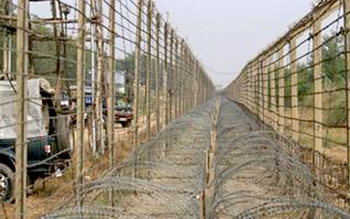Jammu, Jan 3: Pakistan on Friday night resorted to heavy mortar shelling and firing on several BSF posts along the India-Pakistan border in Samba and Kathua districts of Jammu and Kashmir, drawing a strong retaliation from India which killed two Pakistan Rangers.
BSF sources said they have got reports that five Pakistani Rangers have been killed in the exchange of fire since Thursday, with two casualties post 9:30 p.m.
Friday’s ceasefire violation was the fourth by the Rangers in as many days and the eighth in the last nine days.
BSF Director-General D.K. Pathak, who briefed Home Minister Rajnath Singh at 10 p.m., said the force had thwarted a “major infiltration attempt” from across the border tonight and his troops were on high alert.
“We have foiled a major infiltration bid that was being carried out from across the Chorgali border outpost under the cover of heavy ceasefire violation firing,” Mr. Pathak said.
With the violations continuing unabated, Mr. Singh had ordered BSF to respond with “appropriate” action. The Home Minister also said the firing was unprovoked.
A senior police officer in Jammu earlier said that “Pakistan Rangers resorted to heavy firing and mortar shelling along International Border (IB) in Samba and Hiranagar sectors of J&K since 2135 hours tonight.”
Also, IG BSF Rakesh Sharma said that all the Border Out Posts (BoPs) falling in three battalion areas of Samba and Hiranagar are being fired upon by Pakistan amid mortar shelling. Mortar shelling has also hit civilian areas, he said.
There was firing on four BoPs in Samba sector including at Regal, Challiyari, Suchetgarh and also on three to four such posts up to Bansantar forward belt in Hiranagar sector of Kathua district, he said.
The firing and mortar shelling by Pakistan Rangers has come from Razab Sheed, Asif Sheed, Chak Bhura, New Pak and Dhandhar Posts, according to reports.
BSF troops guarding the IB has strongly retaliated, resulting in heavy exchanges which were still ongoing when reports last came in from the area, the officer said.
Police used speakers and announced that people should stay indoors and not venture outside, he said, adding that they have been also told to take shelter in bunkers.
“Firing along international border was reported at 9.30 p.m. on 8 BoPs from areas of Pansar, Bobyan, Manyari and Pahadpur areas of Hirangar sector in Kathua district,” Deputy Commissioner Shahid Choudhary said.
Border residents have been alerted and advised to keep lights off and stay indoors. Evacuation will be initiated early morning in areas where required, he said.
Ambulances and doctors have been deployed at Hiranagar for responding to emergencies and three buildings have been made operational as relief camps keeping in view the volatile situation prevailing in the area, he said.
The Deputy Commissioner of Kathua along with senior officers of administration are camping in Hiranagar for monitoring the situation and coordinating relief and rescue operations.
All local body and panchayat officials and prominent persons in 57 border villages have been asked over the telephone to communicate to the public the messages regarding safety measures. Relief camps have also kept in preparedness, he said.
Eight BSF posts and villages at Patti, Pansar, Londi, Bobyan, Chakara, Lacchipura in Kathua district and seven border outposts in Samba district, including Manguchack, Chilyadiya, Regal, Chachval, Ramgarh, Maluchack and Nanga posts came under fire.







Comments
Add new comment